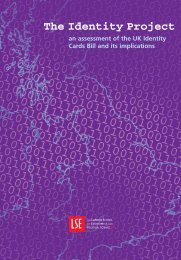Money Laundering: Review of the Reporting ... - Dematerialised ID
Money Laundering: Review of the Reporting ... - Dematerialised ID
Money Laundering: Review of the Reporting ... - Dematerialised ID
Create successful ePaper yourself
Turn your PDF publications into a flip-book with our unique Google optimized e-Paper software.
kpmg<br />
<strong>Review</strong> <strong>of</strong> <strong>the</strong> regime for handling Suspicious Activity Reports<br />
Report <strong>of</strong> recommendations<br />
KPMG LLP<br />
Quality <strong>of</strong> reporting<br />
2.3.5 Good quality SARs have contributed to a number <strong>of</strong> LEA successes. Although <strong>the</strong><br />
volume <strong>of</strong> SARs is increasing rapidly, <strong>the</strong> quality <strong>of</strong> a significant number <strong>of</strong> SARs<br />
remains poor both in content and in <strong>the</strong> form (e.g. handwritten) in which <strong>the</strong>y are<br />
submitted. These poor quality SARs do not deliver what is desired and needed by <strong>the</strong><br />
LEA community to recover assets or investigate money laundering or predicate <strong>of</strong>fences.<br />
Feedback to disclosing entities<br />
2.3.6 There is currently very little feedback provided to disclosing entities by ei<strong>the</strong>r ECB or<br />
LEAs, in relation to <strong>the</strong> quality or results from specific SARs provided by that firm, or<br />
more generally on both typologies and ECB and LEA requirements.<br />
Value added by ECB processes<br />
2.3.7 ECB does not have <strong>the</strong> right number <strong>of</strong> staff with <strong>the</strong> right skill sets to manage <strong>the</strong> more<br />
complex SARs. LEAs do not generally inform ECB <strong>of</strong> <strong>the</strong>ir key priorities or <strong>the</strong><br />
successful use made <strong>of</strong> SARs. ECB cannot <strong>the</strong>refore ensure that <strong>the</strong> most appropriate<br />
SARs are developed through <strong>the</strong> “fast-track” system, i.e. those which are processed and<br />
disseminated to <strong>the</strong> relevant LEA within 24 hours <strong>of</strong> receipt. ECB do not run a search<br />
against ei<strong>the</strong>r <strong>the</strong> Police National Computer or <strong>the</strong> Customs and Excise Data Repository<br />
and Information Computer. The intelligence package produced for LEAs does not<br />
<strong>the</strong>refore <strong>of</strong>ten include all <strong>the</strong> relevant information related to that SAR.<br />
Timeliness <strong>of</strong> processing SARs at ECB<br />
2.3.8 The nature <strong>of</strong> <strong>the</strong> process at ECB, exacerbated by <strong>the</strong> significant number <strong>of</strong> poor quality<br />
SARs provided by disclosing entities, has led to significant delays in disseminating SARs<br />
which are not fast-tracked. There is now a work in progress backlog <strong>of</strong> c58,000 SARs<br />
which have not been disseminated to <strong>the</strong> LEAs, and <strong>the</strong> non fast-tracked SARs currently<br />
being disseminated by ECB are on average ten months old. LEAs indicate that this delay<br />
severely limits <strong>the</strong>ir ability to carry out successful investigations 6 . The extent <strong>of</strong> <strong>the</strong> work<br />
in progress and <strong>the</strong> constant increases in its size have had <strong>the</strong> effect <strong>of</strong> diminishing ECB<br />
staff morale.<br />
LEA activities and <strong>the</strong> use made <strong>of</strong> SARs<br />
2.3.9 LEAs do not generally use <strong>the</strong> intelligence available through <strong>the</strong> Elmer system when<br />
conducting investigations. There are variations in <strong>the</strong> levels <strong>of</strong> commitment and resource<br />
applied by different LEAs to <strong>the</strong> SAR regime and some accord it a very low priority.<br />
LEA management information relating to <strong>the</strong> results from SARs is poor. There is no<br />
agreed best or standard practice at LEAs for taking forward developed SARs.<br />
Financial costs and benefits <strong>of</strong> <strong>the</strong> SAR regime<br />
2.3.10 Determining <strong>the</strong> overall sums spent by ei<strong>the</strong>r disclosing entities or LEAs on <strong>the</strong> SAR<br />
regime with any accuracy is extremely difficult. On a very rough estimate, and subject to<br />
very strong caveats, we believe that disclosing entities may spend around £90m each year<br />
in ongoing compliance costs (although a proportion <strong>of</strong> this would be spent regardless <strong>of</strong><br />
6 This is not <strong>the</strong> case for revenue agencies for which timeliness <strong>of</strong> dissemination is less important.<br />
jo/fh/519 16









